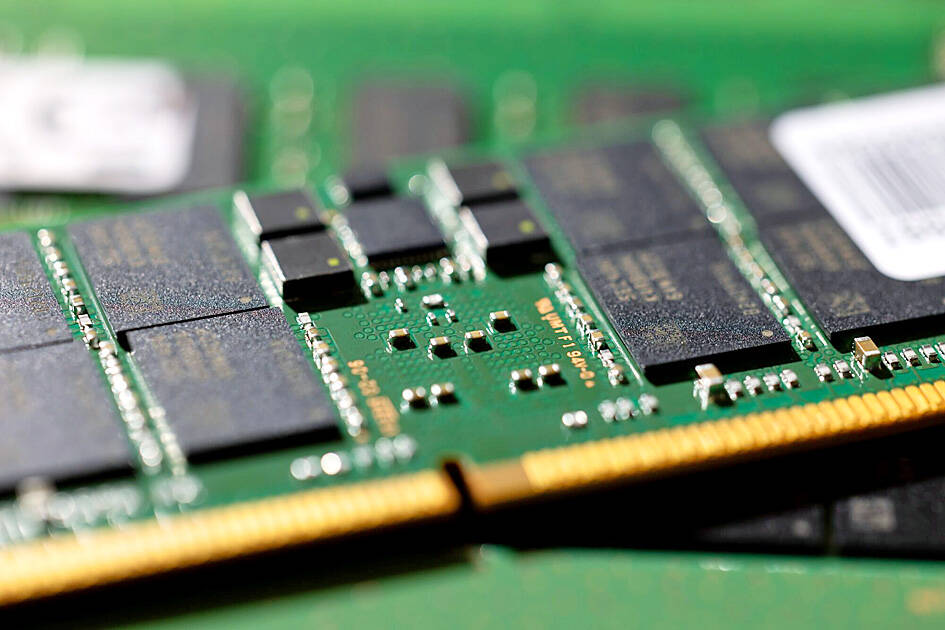South Korea’s export growth continued last month, led by demand for semiconductors, boosting the country’s trade balance to the biggest surplus since 2020 and supporting optimism among policymakers for better-than-expected economic expansion this year.
Shipments that reflect working-day differences increased 9.2 percent from a year earlier, easing from 11.3 percent growth from April, data released by the South’s Korea Customs Service on Saturday said.
Overall imports decreased by 2 percent, while the country’s surplus increased to US$4.96 billion, the largest in 41 months.

Photo: Bloomberg
South Korea has seen gains in the trade balance for a full year, the South Korean Ministry of Trade, Industry and Energy said.
The country’s outbound shipments to China rose 8 percent from a year earlier, while exports to the US increased 15.6 percent, the ministry said.
South Korean industries are having to navigate geopolitical risks stemming from the rivalry between China and the US. China is the nation’s biggest trading partner, while the US provides security guarantees.
The Bank of Korea last month revised its forecast for economic growth sharply higher as export momentum remained robust on the back of demand for products such as semiconductors and automobiles. Chip sales have been particularly healthy, leading gains in overall sales overseas from late last year.
South Korean exports of chips jumped 54.5 percent from a year earlier last month, while those of displays climbed 15.8 percent.
Overseas shipments of solid-state drives used in computers rose 48.4 percent, the ministry said.
While semiconductor exports rose for a seventh month, the pace of increase moderated slightly from 56.1 percent in April.
South Korea and some of its neighbors in Asia occupy positions at the high end of the overall hierarchy of technology supply chains and are set to benefit further from rising demand for electronics needed to advance artificial intelligence and data processing in major economies such as the US.
“Recent data suggest the strength in Asian exports may still have some way to go,” Oxford Economics Ltd economist Sheana Yue (余惠悅) said. “This will, in large part, be due to the chip upcycle.”

TAKING STOCK: A Taiwanese cookware firm in Vietnam urged customers to assess inventory or place orders early so shipments can reach the US while tariffs are paused Taiwanese businesses in Vietnam are exploring alternatives after the White House imposed a 46 percent import duty on Vietnamese goods, following US President Donald Trump’s announcement of “reciprocal” tariffs on the US’ trading partners. Lo Shih-liang (羅世良), chairman of Brico Industry Co (裕茂工業), a Taiwanese company that manufactures cast iron cookware and stove components in Vietnam, said that more than 40 percent of his business was tied to the US market, describing the constant US policy shifts as an emotional roller coaster. “I work during the day and stay up all night watching the news. I’ve been following US news until 3am

UNCERTAINTY: Innolux activated a stringent supply chain management mechanism, as it did during the COVID-19 pandemic, to ensure optimal inventory levels for customers Flat-panel display makers AUO Corp (友達) and Innolux Corp (群創) yesterday said that about 12 to 20 percent of their display business is at risk of potential US tariffs and that they would relocate production or shipment destinations to mitigate the levies’ effects. US tariffs would have a direct impact of US$200 million on AUO’s revenue, company chairman Paul Peng (彭雙浪) told reporters on the sidelines of the Touch Taiwan trade show in Taipei yesterday. That would make up about 12 percent of the company’s overall revenue. To cope with the tariff uncertainty, AUO plans to allocate its production to manufacturing facilities in

Six years ago, LVMH’s billionaire CEO Bernard Arnault and US President Donald Trump cut the blue ribbon on a factory in rural Texas that would make designer handbags for Louis Vuitton, one of the world’s best-known luxury brands. However, since the high-profile opening, the factory has faced a host of problems limiting production, 11 former Louis Vuitton employees said. The site has consistently ranked among the worst-performing for Louis Vuitton globally, “significantly” underperforming other facilities, said three former Louis Vuitton workers and a senior industry source, who cited internal rankings shared with staff. The plant’s problems — which have not

COLLABORATION: Given Taiwan’s key position in global supply chains, the US firm is discussing strategies with local partners and clients to deal with global uncertainties Advanced Micro Devices Inc (AMD) yesterday said it is meeting with local ecosystem partners, including Taiwan Semiconductor Manufacturing Co (TSMC, 台積電), to discuss strategies, including long-term manufacturing, to navigate uncertainties such as US tariffs, as Taiwan occupies an important position in global supply chains. AMD chief executive officer Lisa Su (蘇姿丰) told reporters that Taiwan is an important part of the chip designer’s ecosystem and she is discussing with partners and customers in Taiwan to forge strong collaborations on different areas during this critical period. AMD has just become the first artificial-intelligence (AI) server chip customer of TSMC to utilize its advanced